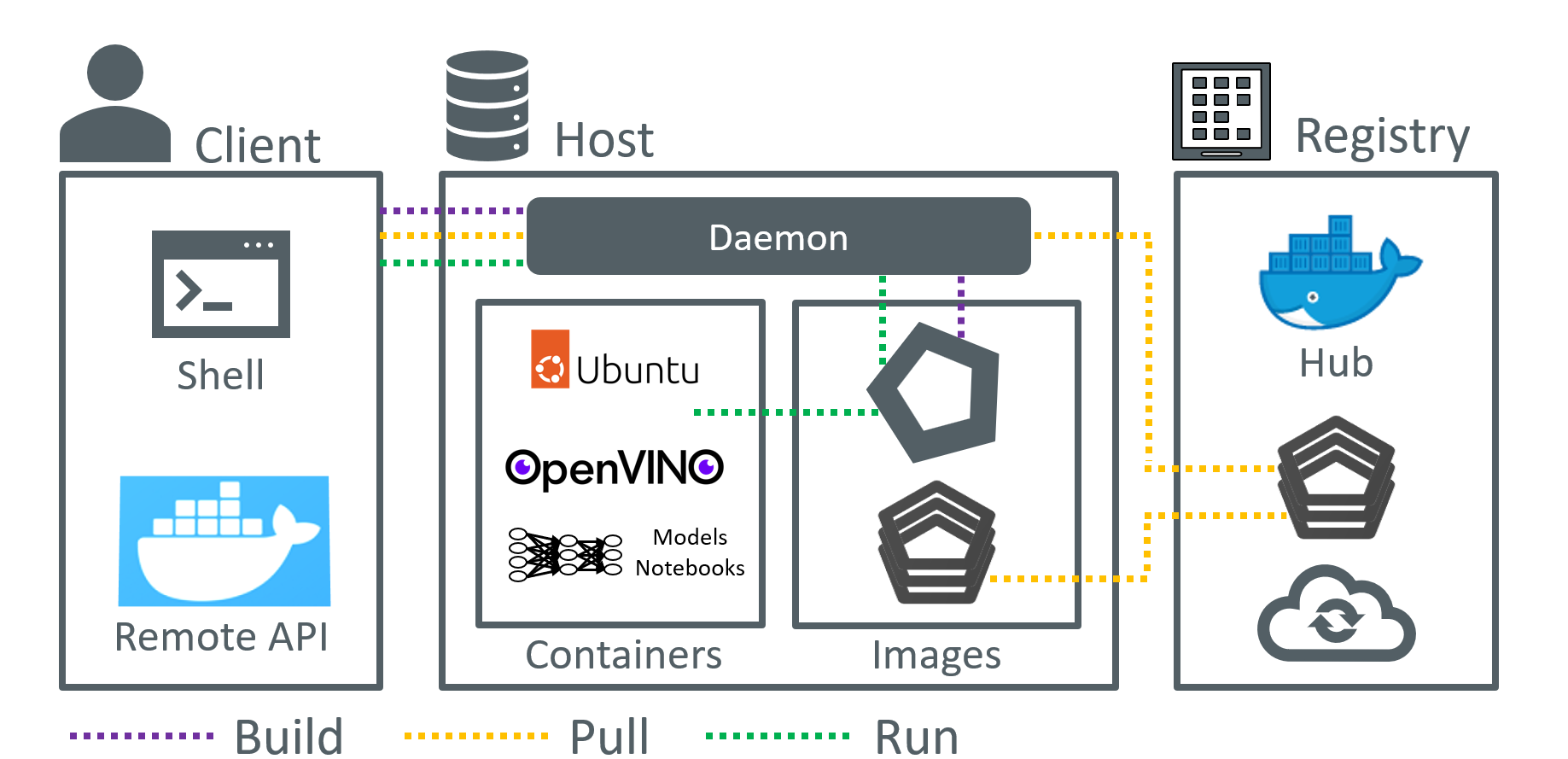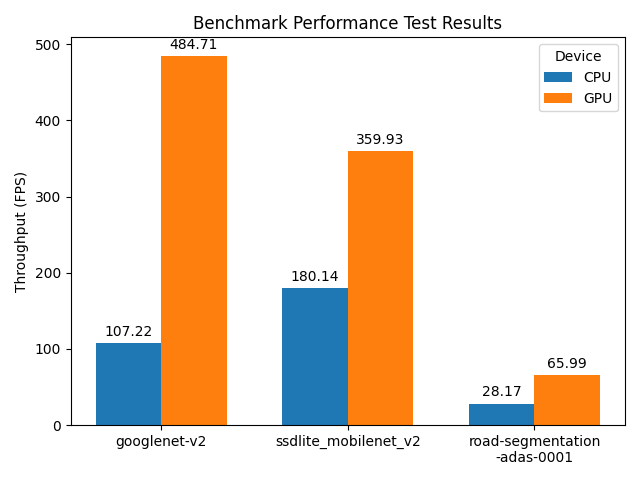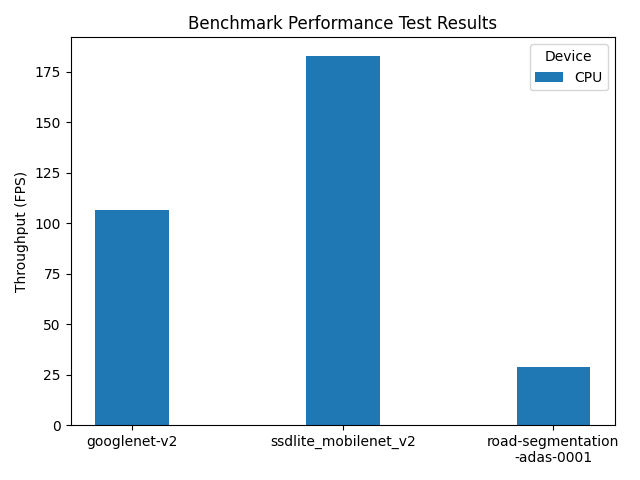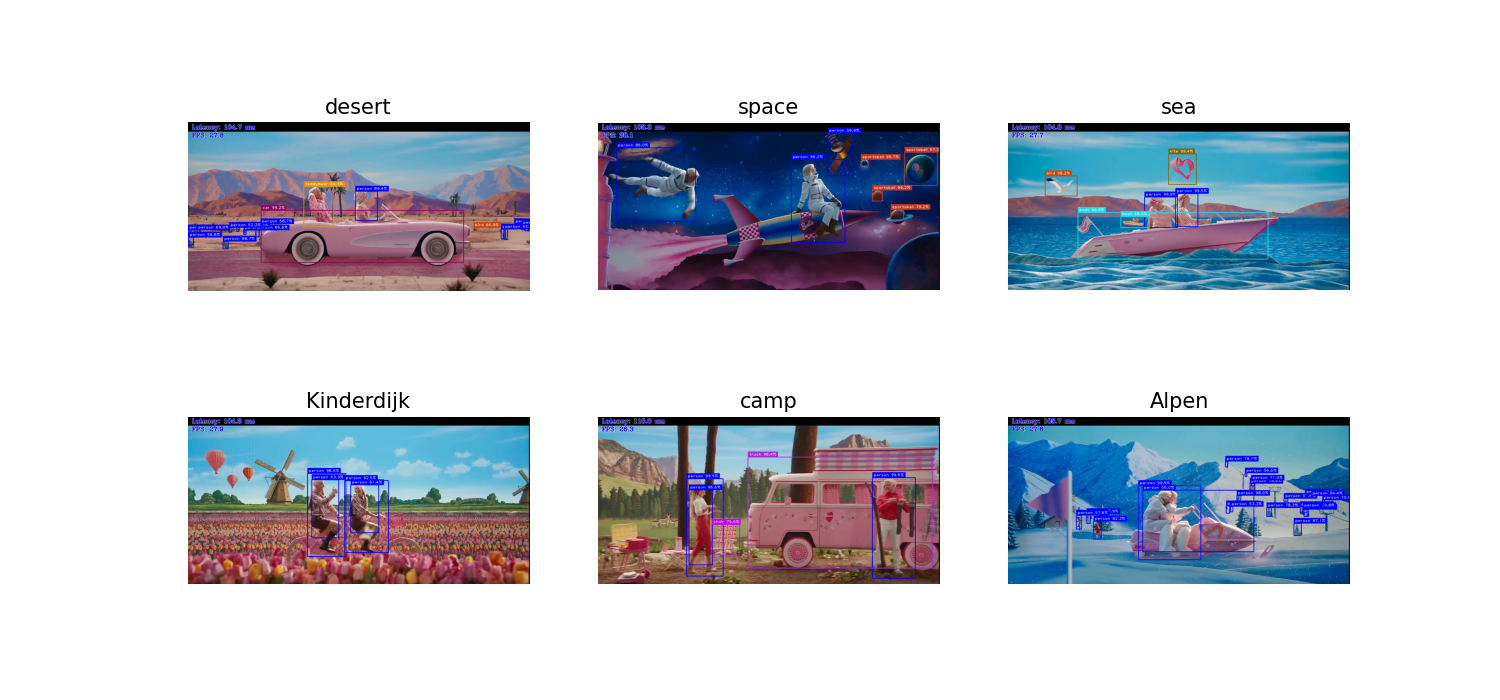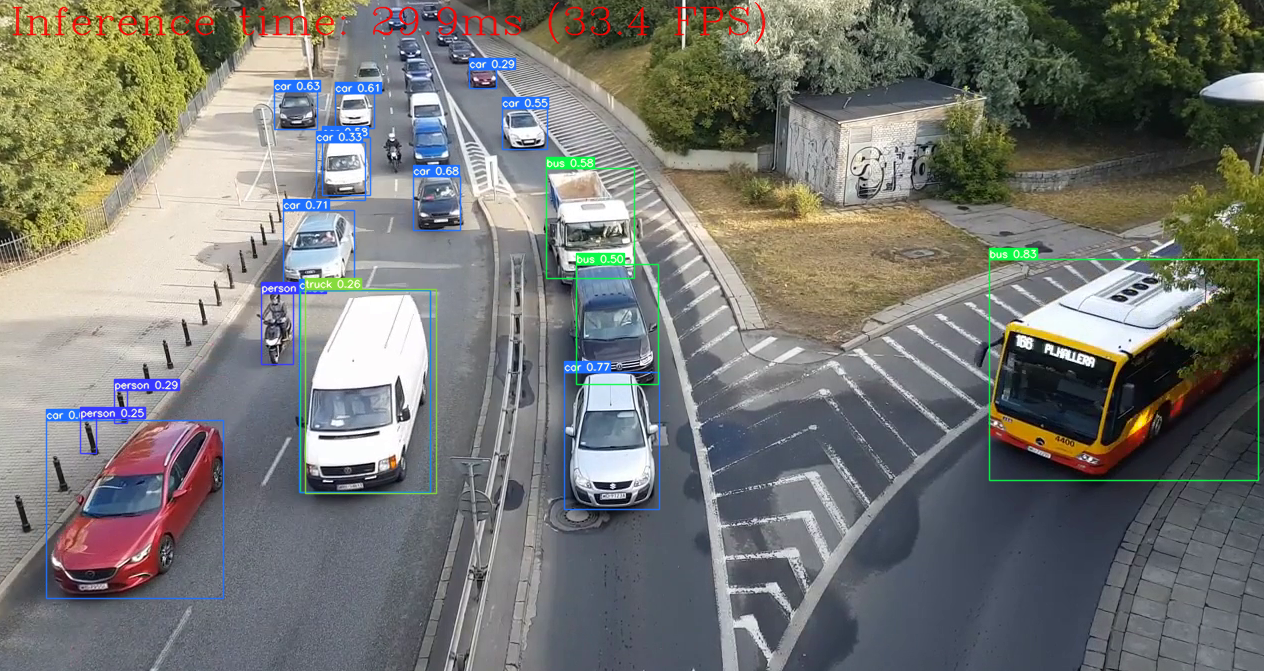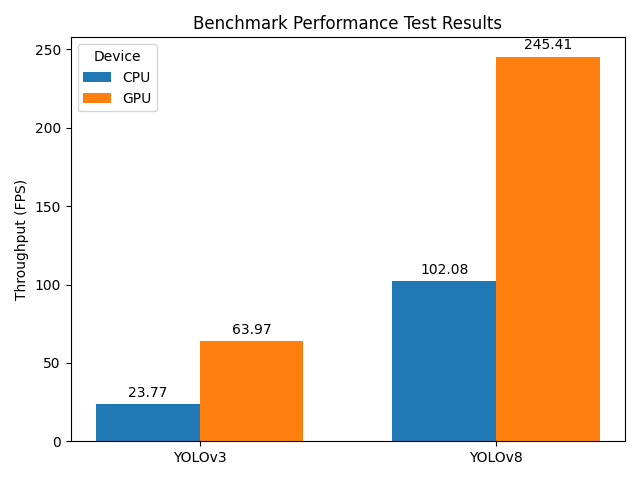-
Containers are a form of operating system virtualization. However, containers do not contain operating system images. This makes them more lightweight and portable, with significantly less overhead.
-
A container includes all the necessary executables, binary codes, libraries, and configuration files. Therefore, it can be run anything from a small microservice or software process to a larger application.
-
In large-scale application deployments, multiple containers may be deployed as one or more container clusters. Such clusters might be managed by a container orchestrator such as Docker Swarm, Kubernetes.
In a nutshell, using containers could be more streamlined to build, test, and deploy the applications on multiple environments, from a developer’s local laptop to an on-premises data center and even the cloud.
First, you will need git to clone this repository to your local computer. If you’re using Linux system like Ubuntu, you can simply do this by:
sudo apt-get install git
Next, clone the repo:
git clone https://github.com/jonathanyeh0723/openvino-with-docker
After that, go to the main folder with Dockerfile inside:
cd openvino-with-docker/
To build the image, run
docker build . --build-arg package_url=https://storage.openvinotoolkit.org/repositories/openvino/packages/2023.0/linux/l_openvino_toolkit_ubuntu20_2023.0.0.10926.b4452d56304_x86_64.tgz -t dockerflamejc/advanipc:latest --no-cache
The above commands would build an image from a Dockerfile:
docker build .: This is the default option to look for a Dockerfile at the root of the build context.--build-arg: Set the build-time variables, in this case ispackage_url. It points to the OpenVINO dev packages directly from public storage.-t: Name and optionally a tag in the name:tag format for easier identify our image.--no-cache: For sake of hardened microservice security, not to use cache when building the image.
Reference of successful build logs:
[+] Building 1194.8s (53/53) FINISHED
=> [internal] load build definition from Dockerfile 0.0s
=> => transferring dockerfile: 14.59kB 0.0s
=> [internal] load .dockerignore 0.0s
=> => transferring context: 2B 0.0s
=> [internal] load metadata for docker.io/library/ubuntu:22.04 1.6s
=> [auth] library/ubuntu:pull token for registry-1.docker.io 0.0s
=> [internal] load build context 0.1s
=> => transferring context: 22.96MB 0.1s
=> CACHED [base 1/8] FROM docker.io/library/ubuntu:22.04@sha256:0bced47fffa3361afa981854fcabcd4577cd43cebbb808cea2b1f33a3dd7f508 0.0s
=> CACHED https://storage.openvinotoolkit.org/repositories/openvino/packages/2023.0/linux/l_openvino_toolkit_ubuntu20_2023.0.0.10926.b4452d56304_x86_6 1.0s
=> [ov_base 2/34] RUN sed -ri -e 's@^UMASK[[:space:]]+[[:digit:]]+@UMASK 000@g' /etc/login.defs && grep -E "^UMASK" /etc/login.defs && useradd -ms / 0.3s
=> [base 2/8] RUN apt-get update && apt-get install -y --no-install-recommends curl tzdata ca-certificates && rm -rf /var/lib/apt/lists/* 12.2s
=> [ov_base 3/34] RUN mkdir /opt/intel 0.3s
=> [base 3/8] WORKDIR /tmp/openvino_installer 0.1s
=> [base 4/8] ADD https://storage.openvinotoolkit.org/repositories/openvino/packages/2023.0/linux/l_openvino_toolkit_ubuntu20_2023.0.0.10926.b4452d563 0.3s
=> [base 5/8] RUN useradd -ms /bin/bash -G users openvino 0.2s
=> [base 6/8] RUN tar -xzf "/tmp/openvino_installer"/*.tgz && OV_BUILD="$(find . -maxdepth 1 -type d -name "*openvino*" | grep -oP '(?<=_)\d+.\d+. 1.2s
=> [base 7/8] RUN rm -rf /opt/intel/openvino/.distribution && mkdir /opt/intel/openvino/.distribution && touch /opt/intel/openvino/.distribution/d 0.4s
=> [opencv 1/7] RUN apt-get update; apt-get install -y --no-install-recommends git python3-dev python3-pip build- 99.9s
=> [ov_base 4/34] COPY --from=base /opt/intel/ /opt/intel/ 0.2s
=> [ov_base 5/34] WORKDIR /thirdparty 0.0s
=> [ov_base 6/34] RUN apt-get update && dpkg --get-selections | grep -v deinstall | awk '{print $1}' > base_packages.txt && apt-get install 13.1s
=> [ov_base 7/34] RUN apt-get update && apt-get reinstall -y ca-certificates && rm -rf /var/lib/apt/lists/* && update-ca-certificates 21.4s
=> [ov_base 8/34] RUN apt-get update && apt-get install -y --no-install-recommends ${LGPL_DEPS} && ${INTEL_OPENVINO_DIR}/install_dependencie 43.2s
=> [ov_base 9/34] RUN curl -L -O https://github.com/oneapi-src/oneTBB/releases/download/v2021.9.0/oneapi-tbb-2021.9.0-lin.tgz && tar -xzf oneap 3.2s
=> [ov_base 10/34] WORKDIR /opt/intel/openvino/licensing 0.0s
=> [ov_base 11/34] RUN if [ "no" = "no" ]; then echo "This image doesn't contain source for 3d party components under LGPL/GPL licenses. They 0.3s
=> [ov_base 12/34] RUN python3.10 -m pip install --upgrade pip 2.3s
=> [ov_base 13/34] WORKDIR /opt/intel/openvino 0.0s
=> [ov_base 14/34] RUN apt-get update && apt-get install -y --no-install-recommends cmake make git && rm -rf /var/lib/apt/lists/* && if [ -z "$O 369.6s
=> [opencv 2/7] RUN python3 -m pip install --no-cache-dir numpy==1.23.1 12.8s
=> [opencv 3/7] WORKDIR /opt/repo 0.0s
=> [opencv 4/7] RUN git clone https://github.com/opencv/opencv.git --depth 1 -b 4.7.0 23.9s
=> [opencv 5/7] WORKDIR /opt/repo/opencv/build 0.0s
=> [opencv 6/7] RUN . "/opt/intel/openvino"/setupvars.sh; cmake -G Ninja -D BUILD_INFO_SKIP_EXTRA_MODULES=ON -D BUILD_EXAMPLES=OFF - 714.8s
=> [ov_base 15/34] WORKDIR /opt/intel/openvino/licensing 0.0s
=> [ov_base 16/34] COPY third-party-programs-docker-dev.txt /opt/intel/openvino/licensing 0.0s
=> [opencv 7/7] WORKDIR /opt/repo/opencv/build/install 0.1s
=> [ov_base 17/34] COPY --from=opencv /opt/repo/opencv/build/install /opt/intel/openvino/extras/opencv 0.1s
=> [ov_base 18/34] RUN echo "export OpenCV_DIR=/opt/intel/openvino/extras/opencv/cmake" | tee -a "/opt/intel/openvino/extras/opencv/setupvars.sh"; 0.2s
=> [ov_base 19/34] RUN apt-get update && apt-get install -y --no-install-recommends opencl-headers ocl-icd-opencl-dev && rm -rf /var/lib/apt/lists/* 10.2s
=> [ov_base 20/34] RUN apt-get update && apt-get install libopencv-dev -y 82.7s
=> [ov_base 21/34] WORKDIR /opt/intel/openvino/samples/cpp 0.0s
=> [ov_base 22/34] RUN ./build_samples.sh -b build && cp -R build/intel64/Release samples_bin && rm -Rf build 16.6s
=> [ov_base 23/34] RUN git clone https://github.com/openvinotoolkit/open_model_zoo && sed -i '/opencv-python/d' open_model_zoo/demos/common/pytho 73.6s
=> [ov_base 24/34] RUN apt-get update && apt-get install -y --no-install-recommends ocl-icd-libopencl1 && apt-get clean ; rm -rf /var/lib/ 2.6s
=> [ov_base 25/34] RUN mkdir /tmp/gpu_deps && cd /tmp/gpu_deps && curl -L -O https://github.com/intel/compute-runtime/releases/download/23.05.255 18.6s
=> [ov_base 26/34] RUN apt-get update && apt-get autoremove -y gfortran && rm -rf /var/lib/apt/lists/* 9.5s
=> [ov_base 27/34] WORKDIR /opt/intel/openvino 0.0s
=> [ov_base 28/34] RUN apt-get update && apt-get install curl vim git -y 11.6s
=> [ov_base 29/34] RUN python3.10 -m pip install matplotlib 6.6s
=> [ov_base 30/34] RUN python3.10 -m pip install pyqt5 22.6s
=> [ov_base 31/34] RUN git clone --recurse-submodules https://github.com/openvinotoolkit/open_model_zoo.git 58.7s
=> [ov_base 32/34] WORKDIR /home/openvino 0.0s
=> [ov_base 33/34] COPY lab . 0.0s
=> exporting to image 13.1s
=> => exporting layers 13.1s
=> => writing image sha256:c830995236f5160d2e57375575fe541e898cb782fc676c778a7fe6ea340d9fb5 0.0s
=> => naming to docker.io/dockerflamejc/advanipc:latest
Checking the image built by running docker image ls
REPOSITORY TAG IMAGE ID CREATED SIZE
dockerflamejc/advanipc latest c830995236f5 27 minutes ago 6.21GB
For more information about building and running the image, refer to https://github.com/openvinotoolkit/docker_ci.
To directly use the latest image built from Docker Hub, run:
docker image pull dockerflamejc/advanipc:latest
Default run the container with interactive mode:
docker run --interactive --tty dockerflamejc/advanipc:latest
Note currently only the CPU plugin is available, we can check by running python3 with following command:
Python 3.10.6 (main, May 29 2023, 11:10:38) [GCC 11.3.0] on linux
Type "help", "copyright", "credits" or "license" for more information.
>>> from openvino.runtime import Core
>>> core = Core()
>>> core.available_devices
['CPU', 'GNA']
>>>
To use GPU accelerator, we need to add the argument --device /dev/dri:/dev/dri like this:
docker run --interactive --tty --device /dev/dri:/dev/dri dockerflamejc/advanipc:latest
Inside the container, running python3 again for plugins confirmation:
Python 3.10.6 (main, May 29 2023, 11:10:38) [GCC 11.3.0] on linux
Type "help", "copyright", "credits" or "license" for more information.
>>> from openvino.runtime import Core
>>> core = Core()
>>> devices = core.available_devices
>>> for device in devices:
... full_device_name = core.get_property(device, "FULL_DEVICE_NAME")
... print(device, full_device_name)
...
CPU 11th Gen Intel(R) Core(TM) i7-1185G7 @ 3.00GHz
GNA GNA_SW
GPU Intel(R) Iris(R) Xe Graphics (iGPU)
>>>
Now the GPU is ready for inference.
In real-world practical use cases, it's more convenient to add volume for easier data usage and webcam for live streaming. For example:
- Bind the local
/home/<user>/Downloadsdirectory to/mntthe container directory:--volume ~/Downloads:/mnt - Link the USB video camera:
--device /dev/video0:/dev/video0
Putting all together:
docker run --interactive --tty --device /dev/dri:/dev/dri --volume ~/Downloads:/mnt --device /dev/video0:/dev/video0 dockerflamejc/advanipc:latest
lab/
├── 0_devices_check.py
├── 1_classification.py
├── 2_object_detection.py
├── 3_segmentation.py
├── demo_object_detection_camera.sh
├── demo_object_detection_video.sh
├── images
│ ├── empty_road_mapillary.jpg
│ └── neymar.jpg
├── inferenced
│ ├── 1.png
│ ├── 2.png
│ └── 3.png
├── intel
│ └── road-segmentation-adas-0001
│ └── FP16
│ ├── road-segmentation-adas-0001.bin
│ └── road-segmentation-adas-0001.xml
├── labels
│ ├── coco_80cl.txt
│ ├── coco_91cl_bkgr.txt
│ └── imagenet_2015.txt
└── public
├── googlenet-v2
│ └── FP16
│ ├── googlenet-v2.bin
│ └── googlenet-v2.xml
└── ssdlite_mobilenet_v2
└── FP16
├── ssdlite_mobilenet_v2.bin
└── ssdlite_mobilenet_v2.xml
11 directories, 20 files
To play more ambitious labs, you'll have to run the container with verbose arguments:
docker run -it --device /dev/dri:/dev/dri --volume ~/Downloads:/mnt -e DISPLAY=$DISPLAY -v /tmp/.X11-unix:/tmp/.X11-unix --rm dockerflamejc/advanipc:latest
In addition, you would need to allow the root user access to the X server with sudo xhost + command. Input sudo password, you should be able to see the following from the console, if successful:
access control disabled, clients can connect from any host
Inside the container, go to the lab directory.
- Classification:
1_classification.py
To run classification:
python3 1_classification.py
- Object Detection:
2_object_detection.py
To run object detection:
python3 2_object_detection.py
- Segmentation:
3_segmentation.py
To run segmentation:
python3 3_segmentation.py
- Benchmark Performance Test Result Visualization:
4_benchmark_plot.py
To quickly check the platform plugins AI computing capability we used, run:
python3 4_benchmark_plot.py
You would need to wait for a couple of minutes for the testing.
[ INFO ] Found CPU plugin: 11th Gen Intel(R) Core(TM) i7-1185G7 @ 3.00GHz
[ INFO ] Found GNA plugin: GNA_SW
[ INFO ] Found GPU plugin: Intel(R) Iris(R) Xe Graphics (iGPU)
Starting to perform benchmark performance visualization...
In addition, in case of integrated graphic card is not successfully activated (this usually due to the use of unverified Linux Kernel version, missing some Docker run command arguments, or in WSL environment not performing post configuration), the plot script also can also handle situation of CPU plugin scenario only.
python3 4_benchmark_plot.py
In such case, You would not see the GPU plugin found message reflected from the console.
[ INFO ] Found CPU plugin: 11th Gen Intel(R) Core(TM) i7-1185G7 @ 3.00GHz
[ INFO ] Found GNA plugin: GNA_SW
Starting to perform benchmark performance visualization...
- Object Detection:
cd lab/
./demo_object_detection_video.sh # video
./demo_object_detection_camera.sh # webcam
- YOLOv8 Implementation
Integrated from OpenVINO Notebooks repo. For detailed information you could further visit 230-yolov8-optimization.
Docker run commands:
docker run --interactive --tty --device /dev/dri:/dev/dri --volume /tmp/.X11-unix/:/tmp/.X11-unix --volume /home/cnai/Downloads/:/mnt --env DISPLAY=$DISPLAY --device /dev/video0:/dev/video0 --rm --hostname openvino dockerflamejc/advanipc:latest
To run YOLOv8 inference with a video:
cd poc
python3 object-detection-yolov8.py --input /opt/intel/openvino_2023/open_model_zoo/demos/object_detection_demo/python/highway_car.mp4
To run YOLOv8 real-time inference with webcam:
cd poc
python3 object-detection-yolov8.py --input /dev/video0
Below is a sample figure for reference.
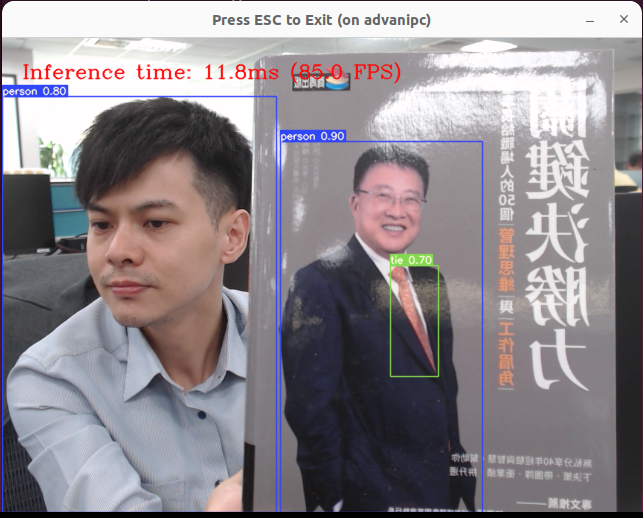
You could also use automation tools Benchmark Python Tool to estimate deep learning inference performance on supported devices, by using command benchmark_app.
The Python benchmark_app is automatically installed when you install OpenVINO Developer Tools using PyPI.
python -m pip install openvino-dev
The benchmark_app includes a lot of device-specific options, but the primary usage is as simple as:
benchmark_app -m <model> -d <device>
- Test for YOLOv8
benchmark_app -m /home/openvino/poc/models/yolov8n_openvino_int8_model/yolov8n_with_preprocess.xml -d AUTO
- Test for YOLOv3
benchmark_app -m /opt/intel/openvino_2023/open_model_zoo/demos/object_detection_demo/python/yolo-v3-tf/FP16-INT8/yolo-v3-tf.xml -d AUTO
- YOLOv3 v.s. YOLOv8 Benchmark Performance
python3 5_benchmark_yolo_plot.py
If you run inference for some tasks, while showing the results encountering warning message like below:
(python3:87): dbind-WARNING **: 07:06:46.828: Couldn't connect to accessibility bus: Failed to connect to socket /run/user/1000/at-spi/bus_1: No such file or directory
you could try the following to suppress the errors:
export NO_AT_BRIDGE=1
Once you have completed validation of this development kit environment, and would like to further deploy to other computer for easier use in the future, you could either push the image to your own Docker Hub repository, or save it as a tar file.
- Push to Docker Hub:
Refer to docker push, once you have created your own account and repository on the Docker Hub, you could simply push the image built to the desired location by running docker push <dockerhub_account>/<repo_name>:<tag>
docker push dockerflamejc/advanipc:latest
You should be able to see the logs like below, if successful:
The push refers to repository [docker.io/dockerflamejc/advanipc]
5f70bf18a086: Preparing
...
2db60c1b32cb: Layer already exists
dc0585a4b8b7: Layer already exists
latest: digest: sha256:da119027d0b33a4aa5752a23052b57a3547c2e2da6fcd6bb48ff08bc4dcae66e size: 8493
- Save as a tar file:
First, check the image built by running
docker image ls dockerflamejc/advanipc:v3, this would output:
REPOSITORY TAG IMAGE ID CREATED SIZE
dockerflamejc/advanipc v3 f7103e24dce6 2 days ago 6.21GB
And then, refer to docker save to save the image using the following command:
docker save dockerflamejc/advanipc:v3 | gzip > sertek_advanipc_ov.tar.gz
Run a simple ls -lh sertek_advanipc_ov.tar.gz command for a quick check:
-rw-rw-r-- 1 cnai cnai 2.4G 九 25 17:36 sertek_advanipc_ov.tar.gz
That's it! Now you have successfully saved the image as a tarball. You could upload to the cloud or copy the a portable USB flash drive.
To load the image, run:
docker load -i sertek_advanipc_ov.tar.gz
You should be able to see the logs like below, if successful:
...
4b56c869dd40: Loading layer 2.56kB/2.56kB
845e284721d7: Loading layer 22.64MB/22.64MB
28ff8a20904e: Loading layer 114.5MB/114.5MB
Loaded image: dockerflamejc/advanipc:v3
If you download or built various images, you want to count the total size of the images so that you can better manage your own space. You could use the python class method count_images_size() prepared. Type python3 in the command line to get into the python prompt:
Python 3.10.12 (main, Jun 11 2023, 05:26:28) [GCC 11.4.0] on linux
Type "help", "copyright", "credits" or "license" for more information.
>>> from lab.utils import utils
>>> utils.count_images_size()
Total docker images size downloaded:
42.54GB, 0MB, 13.3kB
>>>
Taking the downloaded images in my computer for instance:
REPOSITORY TAG IMAGE ID CREATED SIZE
dockerflamejc/advanipc v3 f7103e24dce6 3 days ago 6.21GB
dockerflamejc/advanipc latest 1f31b8535cc2 3 weeks ago 6.08GB
dockerflamejc/advanipc v2 1f31b8535cc2 3 weeks ago 6.08GB
advanipc/demo latest 59ffd52622f0 8 weeks ago 7.3GB
openvino-yolov8 latest 5d9f8f729d2f 2 months ago 11.6GB
sertek_hero_project latest 572d6a933ec1 3 months ago 2.89GB
ov_2023_ubuntu22_pyt311 latest 020d8c9ba799 3 months ago 2.38GB
hello-world latest 9c7a54a9a43c 4 months ago 13.3kB
